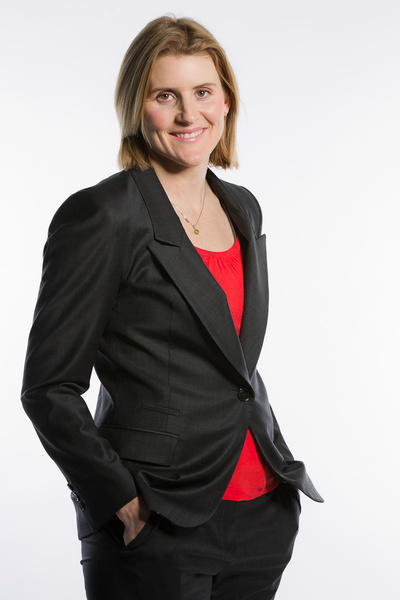Nov. 8, 2016
Earning a master's degree like winning an Olympic gold medal, says Hayley Wickenheiser

Wickenheiser looked into cerebral blood flow in young adults with autism after intense exercise.
Dave Holland
Hers is a mantelpiece replete with personal accolades. Olympic gold medals, world championship medals, MVP awards.
Hayley Wickenheiser probably doesn’t have room for much more. Yet, this particular achievement trumps them all.
“This is by far one of the most rewarding projects I’ve ever done,’’ acknowledged Wickenheiser, Canada’s most decorated female hockey player upon finishing up her master’s program at the University of Calgary.
“It’s given me more joy than many things that I’ve done. It’s pushed me out of my comfort zone; it’s not the field I know the best. But it’s given me as much joy as I’ve ever had winning a gold medal in doing this program for sure, there’s no doubt about it.’’
Education continues for women’s hockey star
On Nov. 10, when the university holds its fall convocation ceremony, one name on the list will be instantly recognizable — that of Wickenheiser, winner of six world women’s hockey championships, four Olympic gold medals and one silver, and named Olympic MVP in 2002 and 2006.
Though she still dons the skates with the Canadian Women’s Hockey League’s Calgary Inferno, she’s attempting to make a name for herself in another field and her Master’s of Science degree is a step in that direction. In the Faculty of Kinesiology, her research looked into the changes in cerebral blood flow in young adults with autism after high-intensity exercise intervention.
The project had its genesis seven years ago with a recreational program called Stepping Out run by the Sinneave Family Foundation and was eventually expanded on by Wickenheiser and fellow student Sarah Benson.
“It’s a labour of love for me and I enjoyed working with that population,’’ explained Wickenheiser, the pride of Shaunavon, Sask. “My goal is to see this program in every major university across Canada. Kinesiology students get a graded practicum and eventually they go on to work in the field somewhere.’’
The team behind the individual
As someone who knows well what it takes to succeed as a team member, Wickenheiser is quick to point to individuals who helped make this education journey possible.
“I think there are three key people in all of this,’’ she began. “First of all Dr. Wayne Giles, who was the former dean of kinesiology, he was very active and instrumental in pushing me to continue this; Dr. Margaret Clarke, the VP of development at Sinneave Foundation, a clinical neurologist specializing in autism; and the third person would be (current Dean of Kinesiology) Dr. Penny Werthner, because without her support and allowing us to continue the program within the faculty, we wouldn’t have had a chance to do this.
“I think as a student you need supporters like that, cheerleaders in your corner, because sometimes you don’t really know where to turn or where the next move is.’’
As an elite international player and a mother to teenaged son Noah, her ability to fit advanced studies into her life has been an enviable task.
“We had a great group that pursued this research, myself, Sarah Benson and Alex Naylor, a former student who runs the program out of AASF (Autism Aspergers Friendship Society),’’ said Wickenheiser. “I consider myself pretty lucky we had the support that we had because there’s no way I could have done this project on my own.’’
Advice: ‘Find something you enjoy to do’
Her words of advice to prospective students wishing to undertake a master’s or PhD are succinct, sort of like one of her tape-to-tape passes.
“I would say the work is a lot easier when you find something you enjoy to do,’’ the 38-year-old said. “You don’t have to look at the whole thing and be overwhelmed. I would say knowledge is freedom and knowledge is power and the more you can attain in your field the more success you’ll have down the road to be able to carve out whatever niche it is that you want to work in.’’
Someone who has been privy to Wickenheiser’s work ethic for years is Danielle Goyette. head of Dinos women’s hockey. Goyette played with her on the national team and coached her at Calgary.
“Anytime she does something she tries to be the best she can be,’’ said Goyette. “When she was on our team, she was a 4.0 student and we had 12 players who were all-Canadians, just to show how much an affect she had on the students. As a coach it helped me because you’re always looking for the best athletes but if they’re not good students it’s not worth it because you have so much follow-up for them. You have players saying, oh I’m tired, I’m so busy. Hey, if this girl can do it, then it’s possible.’’
If Wickenheiser hadn’t chanced upon this particular passion, she would be pursuing medical school — something she plans to do once her playing career is over. She won’t, however, be accepting her degree at this month’s convocation.
“I went to my Bachelor of Science and I just wanted my son to see me walk across the stage once,’’ she chuckled, “and now I think he’d be bored so we’re good.’’
